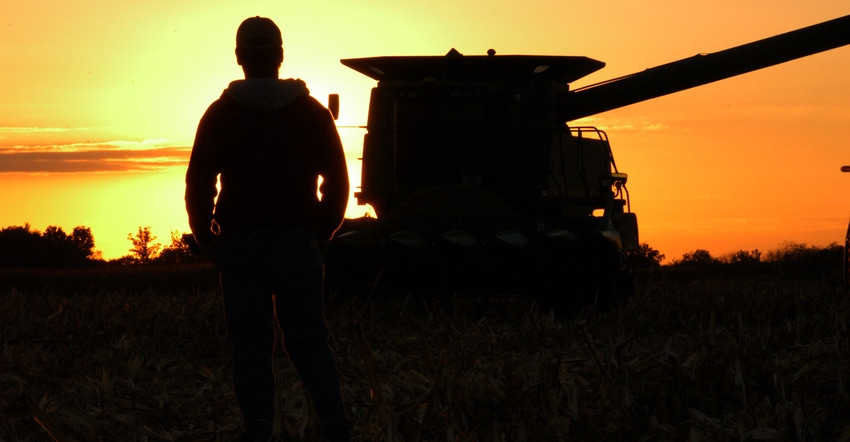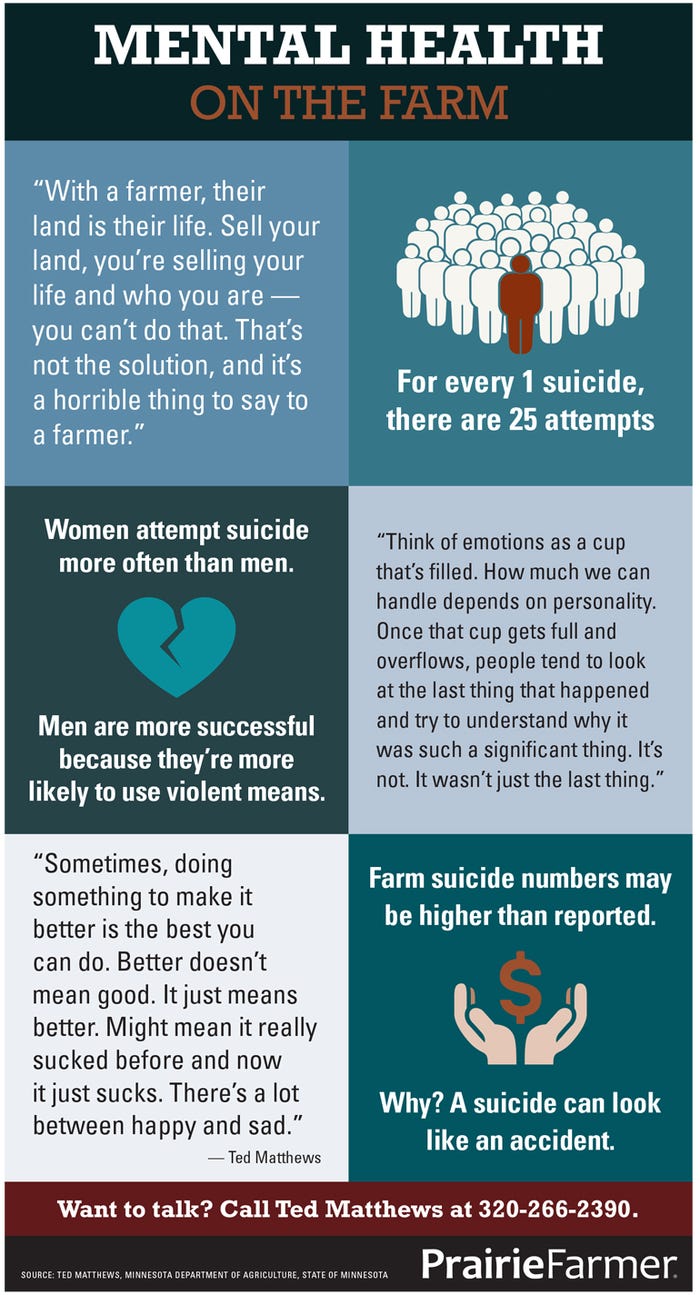May 6, 2019

Life is hard. And agriculture can be especially hard these days.
Farmers and ranchers deal with the uncertainties of market instability, weather, U.S. milk supply, trade disputes, global economic forces, estate and succession plans, family relationships, natural disasters, and some days, just plain old calving disasters. That’s a short list of a lot of uncertainty, with a lot of capital tied up in it.
At Farm Progress, we dedicate more than 6,000 pages every year to telling the story of agriculture, talking about everything from soybean cyst nematode to dicamba to hog manure, and more. We’re increasingly adding more pages that talk about mental health.
Why? Because while the numbers from the Centers for Disease Control and Prevention regarding farmer mental health and suicides are in dispute, those of us in the field know we’re hearing about more of them. I can think of two farmers I know who’ve committed suicide in the past year. Both left young families, including teenage children, behind. Another young farmer contacted me recently as I tweeted quotes from a mental health seminar. We were able to get him in touch with the counselor who was speaking at the seminar by the end of the day.
And then there’s plain old grief. The kind that doesn’t perhaps lead to suicide but makes daily living hard, whether you’re on a farm or not. We’ve been talking about that more, too, and will continue to do so.
Because while the compounding pressures on agriculture are increasing, the resources aren’t necessarily keeping up. A recent poll from the American Farm Bureau Federation shows that 46% of farmers and farmworkers said it’s difficult to access a therapist or counselor in their community. AFBF is urging Congress to fund $10 million for the Farm and Ranch Stress Assistance Network, the level authorized in the 2018 Farm Bill.
The AFBF poll backs up what our Farm Progress editors see, in that 91% of farmers and farmworkers said financial issues impact farmers’ mental health. Nearly as many (88%) said farm or business problems impact mental health, and 87% pointed to fear of losing the farm. Other factors included stress, weather, the economy, isolation and social stigma. None of this is surprising.
Still, farmers think those in agriculture are the least likely to have problems with mental health, compared to people in rural communities, their state, suburban communities, urban communities and the nation. According to the poll, rural adults are more likely to say mental health is a major problem in urban (53%) and suburban communities (41%) than rural communities (38%).
Yet, the survey also found that more than half of all rural adults have either personally sought care or have a family member who has sought care for a mental health condition.
What does it all mean? I think we know we have a problem, but we don’t always want to talk about it. It’s somehow easier to be stoic and say, “I’m fine,” than to have a deep and real conversation about how we’re feeling. And there’s a certain amount of stigma involved. In the survey, nearly 60% of farmers and farmworkers believed their community and friends attach at least a fair amount of stigma to those who seek mental health help. Large majorities of rural Americans polled agreed that cost, social stigma and embarrassment would make it harder for them to seek help or treatment.
And, we don’t always feel confident in spotting warning signs — maybe because we’re a stoic bunch. Only 55% of farmers and farmworkers feel able to spot warning signs, compared to 73% of rural Americans.
But we want this situation to be better. Three out of four rural adults said it’s important to reduce stigma about mental health in the ag community. That’s a good trend in the making.
Resources for people in agriculture may be slim, but they do exist. Minnesota rural counselor Ted Matthews says you can always call him: 320-266-2390.
And whether what you’re facing is grief, depression, suicidal thoughts or family members dealing with trauma or loss, the following articles may be helpful resources to you. They may even be a point of reference to better understand what someone else is going through.
As you read and learn more, ask yourself if you can see a loved one or a neighbor who may be suffering from these emotions. Reach out. Check in. Take a meal. Pray. Help lighten their load, and be a friend with a hug or a shoulder to cry on.
Tears aren’t the worst thing that can happen, and neither is asking for help.
1. I Work With Suicidal Farmers. It’s Becoming Too Much to Bear by Mike Rosmann for The New Republic. Rosmann writes: “I serve as a counselor for farmers and ranchers. I’m probably on the phone or on email anywhere from 15 to 25 hours a week, seven days a week, trying to respond to requests for help from all around the country.
“I only take on the most difficult and unresolvable problems that you could ever see among farm people, where depression has not been successfully treated by any kind of medication or psychiatric help. I try to figure out what to do about them, because — well, I don’t know how else to say this, except that I have a lot of experience doing this. It gets me going.”
2. The Surprising Reality of Depression and Suicide Among Farmers featured on HuffPost. This is a video clip, and it’s emotional.
3. 10 truths about how farm families talk by Holly Spangler for Prairie Farmer. Spangler writes: “Life has changed on the farm in the past 25 years. Here’s what it means for how we talk to each other. Or, you know, don’t talk to each other.”
4. Why do farmers commit suicide? by Holly Spangler for Prairie Farmer. “Desperation, pressure and lack of communication mount. Here’s a look at what really happens, plus what a veteran farm counselor says you can do to help,” Spangler says.
5. All the land between happy and sad by Holly Spangler for Prairie Farmer. “If a farmer in crisis won’t call a hotline, what do you do?” Spangler asks. “Call Ted [Matthews]. He’s talked to more desperate farmers than you can imagine; here’s what he’s learned.”
6. Grief: What really helps by Holly Spangler for Prairie Farmer. “When Josh and Tiffany Flint lost their young son to a rare and aggressive cancer, they had to rebuild a crumbled world,” Spangler writes. “Here’s what they learned, and how you can help friends in crisis.”
7. What a professional says about grief by Tom J. Bechman for Indiana Prairie Farmer. “A mental health professional answers questions about the grieving process after the loss of a child,” Bechman writes.
8. Ag’s No. 1 ambassador made most of his time by Tom J. Bechman for Indiana Prairie Farmer. “Six-year-old Travis Wenning never missed a chance to talk about agriculture and no-till,” Bechman says.
9. Depression, suicide rates skyrocket amongst U.S. producers by Amanda Radke for BEEF magazine. “Production agriculture isn’t for the faint of heart. It takes determination, persistence, weathering through bad times, investing wisely in good times, and the patience to build a legacy through blood, sweat and tears,” Radke says.
10. American farmers confront a mental health crisis by Mario Parker for Bloomberg. Parker writes, “The worst agricultural downturn since the 1980s is taking its toll on the emotional well-being of American farmers.”

Comments? Email [email protected].
You May Also Like




